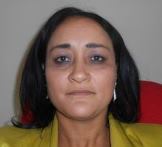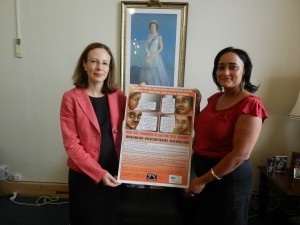6th March 2014 Windhoek, Namibia
UN International Women’s Day 2014 – Guest Blog on Gender Based Violence by Yolande Engelbrecht, Legal Assistance Centre (LAC)
08 March is the 103rd UN International Women’s Day (IWD). Protection of women’s rights is one of six key human rights priorities for the UK.

The FCO has made strong statements on Violence Against Women and Girls (VAWG) and on sexual violence in conflict. The UK is hosting a Global Summit to End Sexual Violence in Conflict on 10-13 June in London. In doing so, we all should bear in mind that sexual violence in conflict is not an issue which only affects women and girls.
As promoting gender equality and women’s empowerment worldwide remains a priority for us, I have invited the local NGO Legal Assistance Centre (LAC), to write a guest blog for UN International Women’s Day 2014.
The civil society, in particular the LAC, is a key partner for our human rights work in Namibia and the British High Commission is proud to have been able to support the LAC with a number of projects dealing with human rights. Today’s blog provides a timely opportunity to highlight BHC Windhoek’s upcoming collaboration with the LAC on a a new project being run in Lüderitz, which aims to strengthen community capacity to address gender and family-law issues.
Educating people on their legal rights – a tool for Women Empowerment

By Yolande Engelbrecht, Legal Assistance Centre, Gender Division, Paralegal
Gender Based Violence (GBV) has become a new ‘religion’ for many Namibian men. Namibia is a country with a low population density, limited hospital facilities and few women’s shelters especially in rural areas, where there are vast distances between towns. Women have to confront and overcome these hurdles. There has been intensified media coverage of a spate of gruesome violence and killings of women in early 2014, with the result that the nation seems to be more focused than ever on ways to respond to and prevent GBV.
The most vital issue in this emergency situation is to continue communication between policy-makers and society at large about the best strategies to curb the terrible killings and violent attacks against our women. It has become a national concern and President Hifikepunye Pohamba convened a national prayer day on 6th March 2014. Various institutions and organisations are trying to find strategic responses to the problem, with the aid of a fleet of dedicated community members and consistent media coverage.

Over the past decades, the Gender Research & Advocacy Project (GR&AP) from the Legal Assistance Centre recognised that growing up in violence has deep and long-lasting impacts on the development and well-being of a nation. The LAC ‘s recent newspaper article in The Namibian (8 November 2013) “Trapped in Marriage?” identified limitations on the provision of legal aid for divorce cases, combined with the slow pace of law reform on divorce, as some of the factors which contribute to trapping spouses in unhappy and even dangerous marriages. Other causes of GBV include alcohol, the hopelessness born of poverty and unemployment, and depictions of violence and gender stereotypes in mass media. But the most essential cause is continuing inequality between men and women. Informing people about their legal rights is a powerful tool to empower women.
Part of the mission of GR&AP is to accomplish this through community outreach programmes. During March 2014, with the financial assistance of the British High Commission, GR&AP will visit Lüderitz for a week of activities based on relevant gender laws, with 50 local participants. What makes the community of Lüderitz stand out is the fact that it has a particularly active Child Care and Protection Forum (CCPF), whose members will attend this important training. The CCPF brings together a range of service providers in the fight against GBV and child abuse. We are also hoping to discuss ways to bolster the self-confidence of women, which suffers unavoidably from high levels of physical and emotional abuse, alcohol and drug abuse and domestic violence.

What we must realise as a nation is that some of the strategies under discussion do not offer long-term solutions and can at best deal with the immediate problem of survival. The question we should also ask is how effective is the overall protection system in reducing violence and killings against women in Namibia? Progress on preventative work could take decades. Nevertheless, it is critical to find permanent solutions for this new ‘religion’ in our country and not be trapped with the shocking reality that more people in Namibia apply for a protection order each year than die in road accidents.
I thank you,
Yolande Engelbrecht